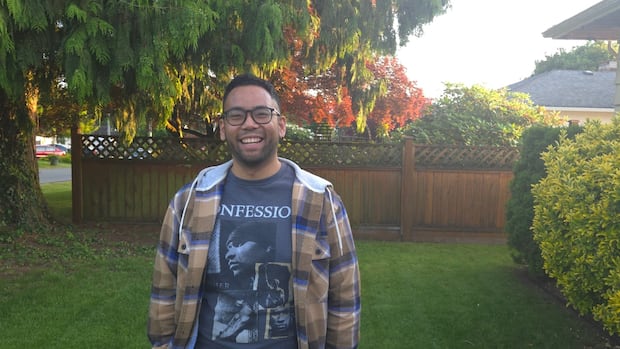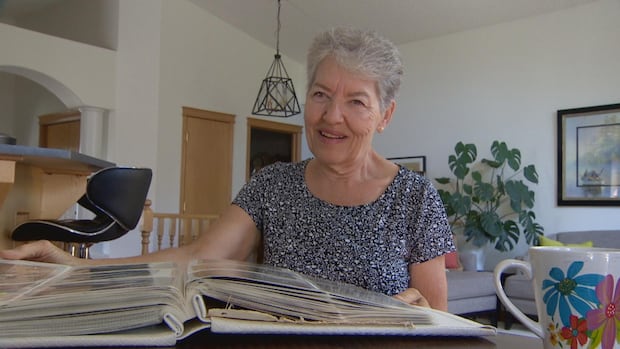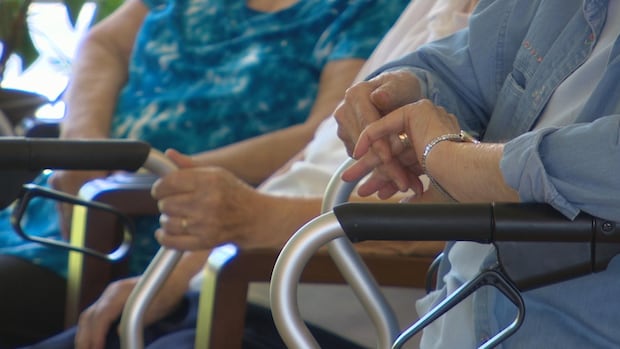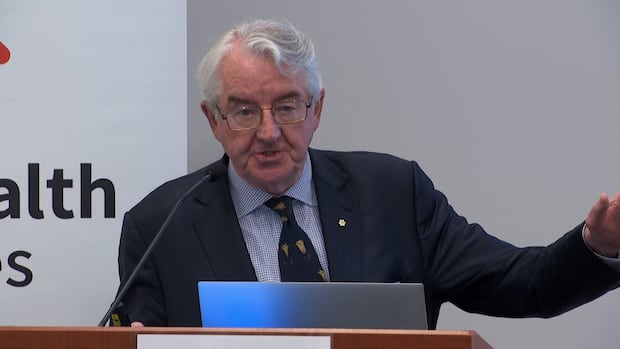Joey Laguio remembers waking up every morning in high school with a sense of dread.
"It felt like always being chased by something," said Laguio, now 33 and living in Vancouver.
After he enrolled in engineering at the University of British Columbia, his first major panic attack hit. Breathing was hard and he trembled, consumed with worries over what others thought of him, he said.
From a counsellor in Vancouver, Laguio learned that he had anxiety, and was referred to Anxiety Canada, a registered charity offering resources online for people with anxiety and obsessive compulsive disorder (OCD).
"The specific resources were helpful to me because I could access them at any time I wanted to and also because they were a good complement to the therapy I was doing," Laguio said.
Now, however, some mental health experts are worried Anxiety Canada's online resources will cease to be available next April if the organization that had funding cut by the B.C. government earlier this year doesn't find a new source of revenue.
They say patients, families and mental health professionals will lose a carefully curated and trustworthy source for mental health information, tips and tools just as misinformation proliferates.
'Worried about what's going to happen'Dr. Julie Eichstedt, a child psychologist in London, Ont., said although anxiety disorders are very treatable, access to resources is a concern.
"I'm worried about what's going to happen to all those people that have been dependent on these [Anxiety Canada] resources," Eichstedt said. There's "really nothing compatible for me to send families to."
 Linda Campbell, left, and her son, Ryan Campbell, turned to Anxiety Canada for help several years ago after a suggestion from a child psychiatrist. (Zoom/CBC)
Linda Campbell, left, and her son, Ryan Campbell, turned to Anxiety Canada for help several years ago after a suggestion from a child psychiatrist. (Zoom/CBC)Linda Campbell of Nanoose Bay, on Vancouver Island, said she was caught by surprise several years ago when her outwardly happy son told her one day when he was in Grade 3 that it was all too much.
Campbell initially equated anxiety with stress and overscheduling her son. Then they found a child psychiatrist who suggested Anxiety Canada.
"I knew I could trust it," Campbell said. "Every health-care provider said go here because we know what you're going to get, so we have a framework between us to have conversations. I don't think I even realized the importance of it at the time."
About one in four people will deal with levels of debilitating anxiety at some point in their lifetime, leaving them unable to work at their full capacity, said Maureen Whittal, a psychologist who co-founded Anxiety Canada in 1999 and is chair of its volunteer board.
Socially, anxiety can interfere with relationships, including marriage and parenting, she said.
Increases in generalized anxiety disorderStatistics Canada says generalized anxiety disorder doubled among those aged 15 and older between 2012 and 2022, rising from 2.6 per cent to 5.2 per cent. Young women 24 and under showed the largest increases.
Anxiety Canada saw $223,200 in provincial funding removed earlier this year and scaled back its services. It is now a skeleton organization relying on a few volunteers but no paid employees.
Its MindShift app, which was shut down when the funding was removed, had more than 1.5 million downloads in 2024, with tens of thousands of monthly users, including teens.
A published study showed use of the app reduced anxiety and stigma and Whittal hopes it could resume if further founding is found. Some of Anxiety Canada's online resources continue to be available as it winds down its services.
Campbell, who is a member of a support group for parents whose children have anxiety disorders, said people will grasp onto what they think will offer quick and easy solutions.
"They're kind of in a desperate moment and they think that this will solve their problem," she said. "I think that's why it's really important to say: 'Here's what we know is proven techniques.'"
 Laguio says he started his mental health journey with professionals 12 years ago. (Matthew Fong)
Laguio says he started his mental health journey with professionals 12 years ago. (Matthew Fong)Earlier this year, Anxiety Canada also wound down its educational podcasts and TikTok videos modelling best practices and cut an online cognitive behaviour treatment program as its funding was reduced.
Eichstedt said she recommends Anxiety Canada to parents and teachers because all the evidence-based content and practical examples are in one place, setting it apart from other services.
Guide to effective treatmentsFor children, avoidance behaviours are one of the hallmarks of anxiety, Eichstedt said. They may miss school, not participate in class or make friends. Marks can go down because the student is afraid to ask for help or can't complete their homework.
"There may be lots of tears, there could be tantrums," Eichstedt said.
But left untreated, anxiety tends to persist and can fuel other problems like depression. Treating anxiety is important to make sure kids develop as they're supposed to, she said.
WATCH | Overcoming the stigma around mental health struggles: For this year's Mental Health Week, the theme is Unmasking Mental Health. CBC Montreal host Douglas Gelevan speaks with Dr. Jennifer Russell, the chief of the department of psychology at the MUHC, about ways people can help themselves or their loved ones overcome the stigma.Robert Roopa, a psychologist and psychotherapist in York Region, north of Toronto, said he often refers to Anxiety Canada's articles and videos.
"If the site is no longer available, I'm concerned that an increasing number of people who need OCD and anxiety support will not receive the appropriate treatment," Roopa said. Then the patient loses time and money on what doesn't help their specific problems.
Filling a 'critical gap'Dr. Peggy Richter, a psychiatrist in Toronto who heads the Frederick W. Thompson Anxiety Disorder Centre at Sunnybrook Health Sciences Centre, says that ideally, people would see a live therapist for help.
"But we recognize across Canada with our geography that that [isn't] always feasible and people with expertise in how to treat the anxiety disorder psychologically are very often very hard to find covered by OHIP or provincial health-care systems," said Richter, who also specializes in OCD.
"MindShift was filling a really critical gap."
The B.C. government's Mental Health and Substance Use Services (BCMHSUS), which provides specialized services in the province, said it issued a contract this year worth about $1 million to BC Partners. Anxiety Canada had been of member of the partners, a group of mental health and substance use organizations, but was no longer included by the government this year.
The 2025/26 funding is half of the $2 million given the previous year, BCMHSUS said.
"While this is less than last year's contract, it is a substantial contribution to health literacy. The other funds were directed towards critical front-line services supporting the care and recovery of people with mental health disorders."
 Maureen Whittal says Anxiety Canada's mission is to provide evidence-based psychological resources to help people and their families. (Zoom/CBC)
Maureen Whittal says Anxiety Canada's mission is to provide evidence-based psychological resources to help people and their families. (Zoom/CBC)B.C.'s Health Ministry said its relationship with Anxiety Canada through BCMHSUS ended earlier this year. No further provincial funding will be available for Anxiety Canada for the next fiscal year, beginning in April.
To revert to full service would take $1 million annually, Whittal said.
Eichstedt is organizing a letter-writing campaign to try to save the now volunteer-run group. She'd like to see federal funding for Anxiety Canada as a national resource and program for anxiety and related disorders.
Laguio, the Vancouver resident, said Anxiety Canada complemented the cognitive behaviour therapy sessions his parents paid for with a psychologist.
As a teen and young adult, Laguio said he dreaded even the thought of driving. "I would have existential crises of like: 'What if I what if I hurt someone or like someone's life ends because of me?'"
LISTEN | Trying to get people to talk about OCD:Ontario TodayWhat do you wish people knew about obsessive compulsive disorder?
Justine De Jaegher was diagnosed with obsessive compulsive disorder in her twenties. It was a disorder that she tried to hide from friends and family. Now she's trying to get people to talk about OCD -- to increase public understanding of the disorder. Justine is joined by clinical psychologist Dr. Caitlin Claggett Woods.Some days he'd stick with what he called a "two" on a 10-point fear scale of Anxiety Canada's fear ladder exercise, where you list actions you'd typically steer clear of and then slowly work through them. For him, it started with driving around a quiet block at night.
Now, Laguio calls the cognitive behaviour therapy received through Anxiety Canada "foundational" to managing his relationships and work.
Laguio said as a non-profit, he felt Anxiety Canada had his best interests at heart.
"It was free," he said. "As someone who was really struggling with my career and finances, that's kind of what I needed."











